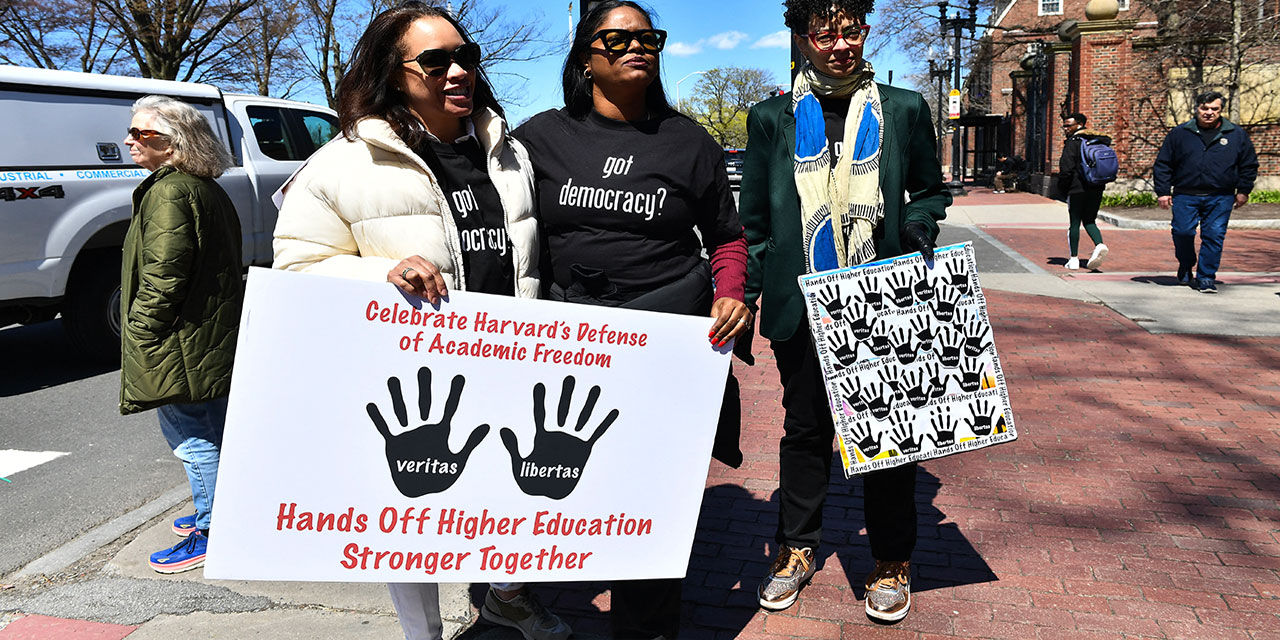
The effort to extirpate identity politics from universities will be a slog. Even as the Trump administration scrutinizes Harvard University for its racial preferences and cuts another $450 million in federal grants, Harvard’s Kennedy School of Government is offering a three-day seminar called “Empowering Black Leaders: Strategies for Personal and Professional Success.” Topics include “Navigating bias in the workplace,” “Intersectionality in its various forms,” “Racial equity in policing,” and “Employee resource groups.”
That last phrase is a euphemism for affinity groups, those identity-based organizations in schools and businesses that came into vogue over a decade ago. Affinity groups allegedly allow intersectional individuals to collectively protect their identities against bias. Kennedy School organizers and other human-resources types are hoping that a new name will shake off the divide-and-conquer associations from the original term.
Finally, a reason to check your email.
Sign up for our free newsletter today.
Empowering Black Leaders is led by a diversity consultant, “one of the world’s leading experts,” as the program brochure puts it, on the “science underlying bias and racism in organizations.” Robert Livingston encapsulated his world-class expertise on institutional racism in a 2022 book, The Conversation: How Seeking and Speaking the Truth about Racism Can Radically Transform Individuals and Organizations. Speaking the truth about racism in a corporate leadership seminar means addressing the topic “Racial equity in policing,” since racist police, one is to assume, impede black managers’ ability to climb the corporate ladder.
The Kennedy School has tried to Trump-proof Empowering Black Leaders by noting that a “person’s race/ethnicity is not a criterion for admission.” The program materials even posit a scenario where non-black allies (another academic coinage) enroll in the program so as to “allow them and the Black colleagues they are supporting to thrive.” Such allyship doesn’t come cheap. The course costs $6,900. Are businesses going to shell out close to $7,000 a head to send their black managers and their white allies to learn about the businesses’ alleged racism? In the pre-Trump world, quite possibly. Today, less so. Though the application deadline was April 29, 2025, as of May 14, the Kennedy School was still soliciting applications.
Despite the effort to be just sufficiently color-blind enough to pass muster from an anti-DEI federal funder, assumptions about racial hierarchy are baked into the program. The seminar is designed for “mid-senior level leaders in North American, Europe, and similarly structured societies,” according to the program brochure. What “similar structure” might that be? Elite-dominated? Welfare-statist? Demographically self-cancelling? No, the common link between North American and European “societies” is their embrace of white supremacy. Thus, any black professionals living on those “similarly structured” continents need consultant-provided tools for overcoming what the program refers to as “commonly shared obstacles” to advancement.
However much the spirit of Empowering Black Leaders contravenes the ethic of the Trump administration, it could not be forced out of the Kennedy School without triggering claims of government overreach. And that prospect reflects the dilemma facing the entirety of the Trumpian academic reform effort. Over decades, the curriculum and the faculty have been on a steady march leftward (though proceeding on autopilot rather than according to any concerted plan). Every aspect of Western civilization is now subjected to deconstructive acid, every work’s patent intentions or high ideals “demystified” as a cover for oppression. A lesson on Kant at West Point inevitably asks students to address Kant’s alleged support for racial hierarchies. Students may be light years from grasping Kant’s core philosophical ideas, but they will have plenty to say about Kant’s racism.
And now that the hermeneutics of suspicion has become the unquestioned default in academia—without anyone outside the academy noticing—changing that default runs up against the seemingly impregnable barrier of “academic freedom.” Getting around that barrier is the challenge. Republican state legislatures have been experimenting with bans on the incorporation of “divisive concepts” in K-12 curricula. The divisive-concepts term first surfaced a year or two ago in model legislation crafted to rout diversity ideology from schools. A government’s right to dictate course content is strongest regarding elementary and high school education. Democratic lawmakers, suddenly exercised about Republican violations of students’ and teachers’ fictional “academic freedom,” have been mandating ethnic studies curricula and anti-bias training for years. But even though elected leaders have the authority to determine which cultural inheritances K-12 schooling should provide to children, doing so in the current polarized environment is fraught. Terms such as “divisive concepts” may be easily understood by critics of identity politics, but they are inherently vague and capable of a range of contradictory applications. Drafters of divisive-concepts bills respond by providing examples, such as believing in the superiority of one race over another, but these definitions, too, are subject to differing interpretations.
If trying to remove left-wing ideology from K-12 education is difficult, doing so from higher education is even more so. Not only is government’s right to condition system-wide funding on curricular reform vehemently contested—at least when that reform tries to lessen an anti-Western orientation—but the anti-Western orientation in higher education is so pervasive that a full-time auditor could barely identify all its manifestations. Removing it would collapse nearly every humanities department, much of the social sciences, and a growing portion of the hard sciences. And enforcing such a curricular reform condition would entail a battle from which even critics of hyperinflated academic freedom might flinch.
The resources of the anti-Western academy are wide and deep. The Trump administration can sue against racial preferences and opt not to fund particular research. But it will take a more broad-based coalition of alumni, donors, trustees, and opinion-makers focused over years to make courses like Empowering Black Leaders the atavistic relics that they deserve to be.
Photo by JOSEPH PREZIOSO/AFP via Getty Images
City Journal is a publication of the Manhattan Institute for Policy Research (MI), a leading free-market think tank. Are you interested in supporting the magazine? As a 501(c)(3) nonprofit, donations in support of MI and City Journal are fully tax-deductible as provided by law (EIN #13-2912529).
Source link
















